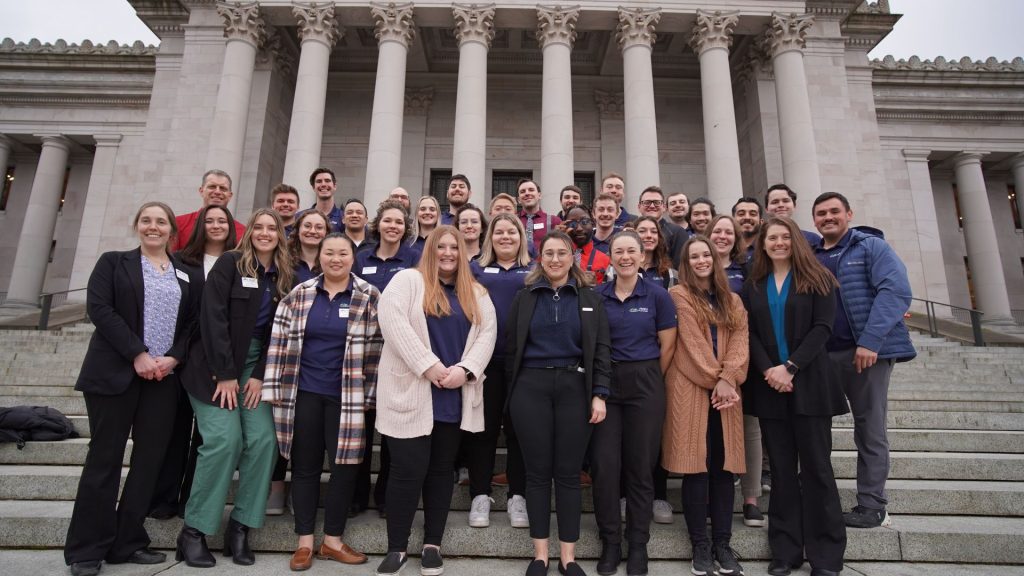PNWU representatives visit The Washington State Capitol to advocate for the power of physical therapy.
“Participating in advocacy like this makes you realize that you can make a difference,” explained Dr. Tiffany Salido. About a year ago, Dr. Salido moved from Asheville, North Carolina to Yakima, Washington to join the faculty of PNWU’s inaugural School of Physical Therapy (SOPT) class as an assistant professor.
A passionate advocate for improving access to, and quality of, physical therapy services, Dr. Salido recently departed PNWU’s campus on a charter bus. Leaving at 5:30 a.m. and filled with over thirty PNWU students, faculty and staff, the bus bounded for The Washington State Capitol, where all aboard would spend the day educating, connecting with, and inspiring state leaders and legislators in support of our mission.
“We want our students to be future leaders,” explained Dr. Peggy R. Trueblood, founding director of PNWU’s SOPT. “One way to do that is to expose them to these types of advocacy efforts.”
“How you practice is determined by bills such as the ones we advocated for,” explained Dr. Salido, who felt particularly connected to a specific state bill which focused on dry needling, a treatment she used in her North Carolina-based PT practice to treat pain and movement issues associated with myofascial trigger points. “Connecting with your legislators regarding issues that concern your practice is powerful,” she urged. “I had several students with me in each meeting, and I was impressed with their professionalism and poise.”



Informed and driven by his own experiences with the power of advocacy, Dr. Brad Callan – also an assistant professor in PNWU’s School of PT – joined the collection of PNWU representatives. Having previously worked with American Physical Therapy Association’s (APTA’s) Washington chapter to educate and inform state representatives about the limitations that faced PT practitioners specifically related to spinal manipulation, Dr. Callan understood the often-times lengthy process of passing and implementing legislation, and – more importantly – the tremendous impact that those grassroots efforts have a on patients.
As they moved around the Capitol, PNWU representatives were equipped with bill numbers, talking points, and meeting times, which were provided by the APTA. From there, Dr. Callan explained, all they had to do was “show up on time and discuss what we are passionate about.”
“If we cannot use all the treatments that are available to us, our patients will suffer,” Dr. Callan urged. “At the end of the day, that’s who we are fighting for.”
“I always enjoy working with others who have never been a part of these formal advocacy efforts,” he added. “People often have these ideas that the politicians are difficult to talk to, overly partisan, or not interested in what a single person has to say, but when you sit down with them you realize that they are just people who are trying to make a difference in their community. They want to hear what you have to say, and often they are not a part of the healthcare community, so they are very intrigued by what we are talking about. They look to us as experts and are generally quite receptive to our comments.”
“It is part of our responsibility, as physical therapists, to connect with the public at large,” explained Dr. Trueblood. “There are so many people out there unaware of the knowledge and tools we possess that can help people. Through advocacy, we can change that.”
